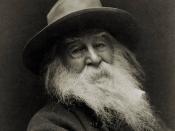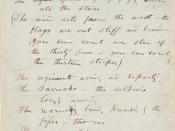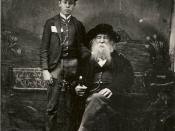IN THE EYES OF WALT WHITMAN.
The unique path that Walt Whitman followed during the American Civil War (1861-1865) led to an insightful record that captures the turmoil of this era on an intimate level. Like all transformational events in history one must examine the literature of the time to reach an understanding of the effects on common people. Whitman is generally regarded as the greatest American poet. This essay will show the many themes in his prose.
Whitman was considered one of the most important American poets of the 19th Century. Whitman was a free thinker who wrote how he lived while managing to be optimistic and romantic which inspired his readers. Whitman identified strongly with the average person of society. One famous quote he wrote said "Not till the sun excludes you do I exclude you." (Lowen, Nancy- page 11) People hailed him as the most authentic voice of the United States of America.
Edgar Allen Poe had said, "The vitality and variety of his life was the mere reflection of the vitality and variety of the United States of America."
The most poignant scenes of the Civil War come from Walt Whitman's wartime prose and most distinctly his book of poetry entitled "Drum Taps" in 1865. Several of "Drum Taps" poems resulted from his years in Washington, D.C., spent as a psychological nurse healing sick and wounded soldiers. Whitman wrote to a friend in 1863, "The doctors tell me I supply the patients with a medicine which all their drugs & bottles & powders are helpless to yield"(2) in reference to the aid of his cheerful disposition and careful attention to the welfare of the soldiers.
Whitman's most persistent American theme is "the individual and the community," in "Song of Myself" he introduces himself as "Walt Whitman,


